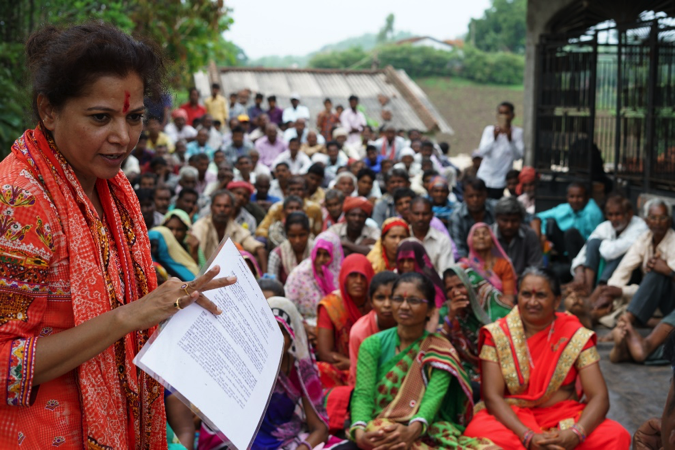 Photo by Panvi Shah/Majority World for the Fund for Global Human Rights (All rights reserved).
Photo by Panvi Shah/Majority World for the Fund for Global Human Rights (All rights reserved).
An activist from Developing Initiatives in Social and Human Action (DISHA) discusses local farmers’ concerns in Vasiya Village, India.
At a time of rising authoritarianism, hatred, and discrimination across the globe, the awarding of the 2018 Nobel Peace Prize to Nadia Murad and Denis Mukwege is a reminder of the power of grassroots activism. Its importance was also recently noted by Zeid Ra’ad Al Hussein, former UN High Commissioner for Human Rights, who argued that our future depends on grassroots leaders and movements—ordinary people exhibiting extraordinary courage in extreme circumstances.
We know from both history and contemporary politics that transformational change is possible when social movements are led by the communities whose rights are being violated. In the United States, for example, the #MeToo movement, born out of a grassroots campaign, has captured the headlines and attention of millions worldwide, leading women to name (mostly) men’s misuse of power and call for justice. And over the last century, women’s rights movements successfully fought for women’s right to vote, the civil rights movement worked to end segregation and discrimination against African-Americans, and LGBTI groups mobilized to win the right to marry and receive more equal treatment under the law.
Despite the proven success of grassroots campaigning, and recognition of its ability to create long-lasting change, many in the philanthropy sector continue to focus on short-term interventions, rather than the longer-term possibilities offered by social movements that address human rights abuses.
At the Fund for Global Human Rights (the Fund), we’ve spent over 15 years providing flexible funding and technical assistance to community leaders and frontline groups around the world. Through this, we’ve learned that grassroots movements need a specific type of support—support that traditional approaches to philanthropy do not account for.
Building a grassroots movement is not a project that has an easily defined beginning, middle, or end. Movements are inherently long-term, complex, and unpredictable, and the human rights issues they address cannot be solved with short-term, acute, and discrete injections of funding. Log-frames simply cannot demonstrate or predict the work necessary to change entrenched power structures and social norms. Donors must learn to have patience and understand that social movements are designed to tackle root causes of inequality, marginalization, and oppression. This kind of transformation takes time and requires flexibility and tolerance for setbacks. Collective processes can be messy and sometimes slow, but they are more effective in the long-run and the best chance we have for creating a world in which all people are treated with dignity.
Traditional philanthropic models also often focus on financial resources alone, but grassroots movements need more than just money to sustain themselves and succeed. They need access to lessons and insight from movements in other countries; support in developing their financial management, fundraising, and communications capacity; and more holistic approaches to security. These are just some of the needs our partners have expressed, and gaps that the Fund has sought to fill through our technical assistance, networking, and convening work.
In Morocco and Tunisia, long-term flexible funding coupled with capacity building and technical support from the Fund has enabled grassroots women’s rights groups to build powerful constituencies for change. In both countries, the Fund supports portfolios of frontline women’s rights groups who have achieved important legislative wins protecting women’s rights, and are now working to put these laws into practice in their communities. Not long ago, as grassroots women’s rights groups in Morocco were growing and refining their approach to advocacy and community mobilization, the Fund facilitated mentorship programs, exchanges, and convenings between them and rural women’s rights groups in Tunisia—who were grappling with developing their community mobilization strategies. This support helped Tunisian groups learn about, adopt and build on approaches to community education and mobilization that were successful in Morocco, such as developing mobile listening centres (which serve as a safe space for women to organize, learn about their economic and social rights, and seek legal support). Since facilitating these alliances, the women’s rights movements across Morocco and Tunisia have continued to support and influence each other, strengthening their power and ability to tackle the root causes of women’s inequality in both countries.
Where effective support for grassroots movements requires the most radical departure from traditional philanthropy is around trust. This is also the hardest to get right. Because “trust” does not just mean that a funder should refrain from imposing prescriptive solutions about problems they know little about. It also means that we own the problems as our own, looking at how we benefit from and even helped to create the injustices that plague so many people around the world. Our partners are not simply “others” we need to help; they are partners in our joint work to dismantle those injustices. We must trust in their expertise, deep contextual knowledge, locally-relevant approaches, and community relationships. In turn, we must ask them to trust us to support their visions and efforts in the way they most need and to stick by them through their triumphs and failures.
While the world grapples with increasing inequities and populist rhetoric, grassroots activism offers us a solution—the ability to mobilize people and build powerful constituencies for change. Through adopting more flexible, holistic, and trust-based approaches to resourcing and supporting this work, we—in he donor community—can be part of the solution. This process will require funders to make sacrifices, learn humility, and begin to question how dated philanthropy models can thwart, rather than fuel, grassroots activism and social change.
